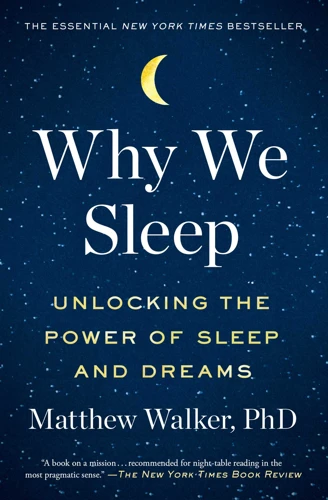We all know how important sleep is for our physical and mental well-being. However, with our hectic lifestyles and daily stressors, getting a good night’s sleep can be a struggle for many of us. This is where the power of aromatherapy comes in. Aromatherapy is the practice of using natural plant extracts, known as essential oils, to promote health and well-being. But how exactly does it work? And what are the benefits of using aromatherapy for better sleep? Let’s dive into the science behind aromatherapy and explore the best essential oils and techniques for a restful night’s sleep.
The Science behind Aromatherapy
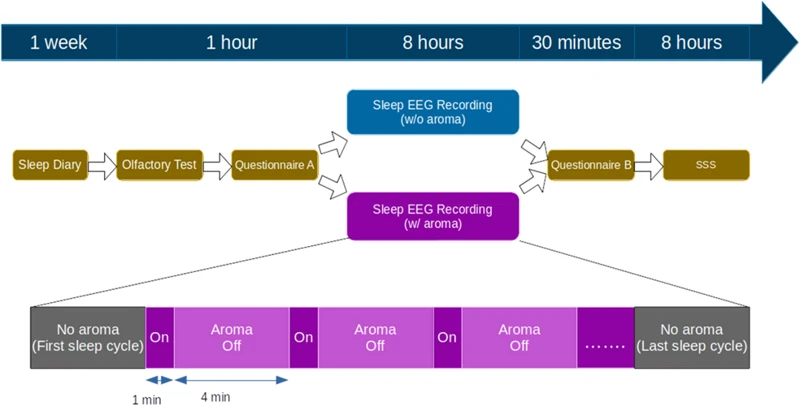
Have you ever wondered why certain scents have the power to calm you down, make you feel more alert, or even transport you to a different place and time? The science behind aromatherapy explores the fascinating relationship between scents and our brains, and how harnessing the power of essential oils can have a positive impact on our physical and mental well-being. In this section, we’ll delve into the science behind aromatherapy and how it works to promote better sleep.
How Scents Affect the Brain
How Scents Affect the Brain
The olfactory system, which is the sense of smell, is intimately connected with the brain. When we inhale certain scents, it triggers the olfactory system which sends signals to the brain’s limbic system. The limbic system is responsible for regulating emotions, memory, and behavior. This is why scents can have a powerful effect on our mood and overall sense of well-being.
The limbic system communicates with other parts of the brain to either release or suppress certain hormones and neurotransmitters. For example, the scent of lavender has been shown to increase the production of serotonin, a neurotransmitter that promotes feelings of happiness and relaxation. On the other hand, the scent of peppermint can help improve focus and concentration by increasing the production of norepinephrine.
In addition to the limbic system, scents can also affect the autonomic nervous system. This system controls important bodily functions such as heart rate, digestion, and breathing. Certain scents can stimulate the parasympathetic nervous system, which activates the body’s “rest and digest” response, leading to feelings of relaxation and calmness.
It is important to note that individual responses to certain scents can vary based on personal experiences and memories associated with them. This is why it’s important to experiment with different scents to find the ones that work best for your individual needs and preferences.
The Role of Essential Oils in Aromatherapy
Essential oils are the backbone of aromatherapy practices, and they are derived from various parts of plants such as flowers, leaves, bark, and even roots. These oils contain potent natural compounds that offer therapeutic benefits, and their effectiveness largely depends on their quality and purity.
The role of essential oils in aromatherapy is essentially to harness the healing properties of these natural ingredients to promote better physical and mental health. When inhaled, essential oils stimulate the olfactory system and activate various chemical messengers in the brain that can affect mood, emotions, and other physiological functions.
Different essential oils have different properties and can have different effects on the body and mind. For instance, some oils are known for their calming and relaxing properties, while others are known for their energizing or uplifting effects. Some essential oils are also known for their anti-inflammatory, analgesic, or antiseptic properties, which can be beneficial for managing a variety of health conditions.
In addition to inhalation, essential oils can also be applied topically through massage, baths, or skin-care products. When absorbed through the skin, essential oils can enter the bloodstream and travel to different parts of the body to provide localized or systemic benefits.
Overall, essential oils play a crucial role in aromatherapy by providing a natural and effective way to enhance physical, mental, and emotional wellness. By selecting the right essential oils and using them properly, individuals can enjoy the therapeutic benefits of these natural ingredients and achieve better sleep and overall health.
The Benefits of Aromatherapy for Sleep
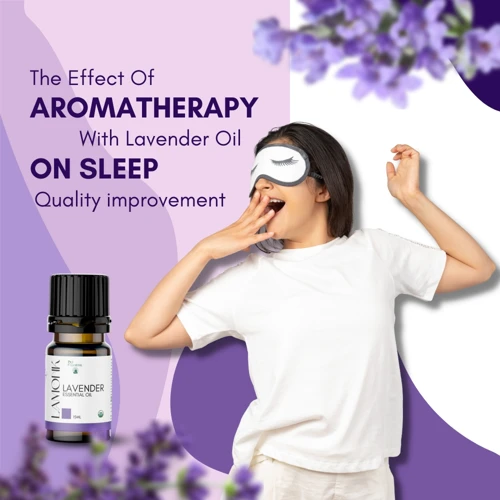
Getting a good night’s sleep is essential for both physical and mental health. However, many people struggle to get the sleep they need. Insomnia, stress, and anxiety can all contribute to poor sleep quality and duration. Aromatherapy is a natural and effective way to relax the mind and body, promoting better sleep. Using certain scents can have a powerful impact on the brain and body, reducing stress and anxiety and improving sleep quality. In this section, we will explore the benefits of using aromatherapy for sleep and how it can help you get the rest you need to feel your best.
Reducing Stress and Anxiety
Stress and anxiety are some of the most common causes of sleep problems. Aromatherapy is a natural way to alleviate these issues, promoting calm and relaxation. The use of essential oils in aromatherapy has been shown to have a positive effect on the brain, triggering the release of chemicals such as serotonin and dopamine that help regulate mood and ease stress.
Here are some essential oils that are particularly effective at reducing stress and anxiety:
| Essential Oil | Benefits |
|---|---|
| Lavender |
Lavender is one of the most well-known and widely used essential oils for relaxation. It has a calming effect on the nervous system, helping to reduce anxiety and promote sleep. Lavender also has antimicrobial properties that can help to prevent infection and illness. |
| Chamomile |
Chamomile is another popular essential oil that is often used to promote relaxation and reduce anxiety. It has a soothing effect on the mind and body, helping to ease stress and tension. Chamomile also has anti-inflammatory properties that can help to relieve pain and inflammation. |
| Bergamot |
Bergamot is a citrus essential oil that has a refreshing and uplifting scent. It is known for its ability to reduce stress and anxiety, while also promoting a positive mood. Bergamot can also be used to help relieve symptoms of depression and seasonal affective disorder (SAD). |
| Ylang-Ylang |
Ylang-ylang is an essential oil that is often used to promote relaxation and reduce stress. It has a sweet and floral scent that is both calming and uplifting. Ylang-ylang has also been shown to have a positive effect on heart rate and blood pressure, reducing symptoms of anxiety and stress. |
| Sandalwood |
Sandalwood is a woody and earthy essential oil that is known for its ability to promote relaxation and reduce anxiety. It has a grounding effect on the mind and body, helping to promote a sense of calm and serenity. Sandalwood can also be used to help relieve symptoms of depression and insomnia. |
When using essential oils for stress and anxiety, diffusing them in a room or diluting them in a carrier oil for massage can be effective methods. It is important to choose high-quality essential oils from a reputable source to ensure their safety and effectiveness. Consulting a health professional is also recommended, especially for individuals with underlying health issues or sensitivities. With these precautions in mind, aromatherapy can be a natural and effective way to reduce stress and anxiety, promoting a better night’s sleep.
Improving Sleep Quality and Duration
When it comes to improving our sleep, the quality and duration of our rest are both important factors to consider. One of the significant benefits of aromatherapy is that it can help with both of these aspects. Below are the ways in which aromatherapy can help improve sleep quality and duration:
- Reducing insomnia: Insomnia is a common sleep disorder that can make it difficult to fall asleep, stay asleep, or both. Research shows that the use of aromatherapy, particularly with essential oils like lavender, can help insomniacs improve their sleep duration and quality.
- Reducing sleep interruptions: Essential oils like chamomile, bergamot, and ylang-ylang have been shown to reduce sleep interruptions by calming the body and mind, leading to more restorative sleep.
- Promoting relaxation: Aromatherapy can promote relaxation, which clears the mind of stress and anxious thoughts. When the mind is cleared, it becomes easier to fall and stay asleep for an extended period.
- Alleviating sleep apnea symptoms: Sleep apnea is a sleep disorder caused by the obstruction of the airway during sleep, resulting in breathing difficulties. Inhalation of essential oils like eucalyptus, peppermint, and tea tree can help alleviate sleep apnea symptoms, allowing better and longer sleep.
- Boosting mood: When we feel good mentally, we tend to sleep better. Essential oils like lavender, sandalwood, and bergamot are known for their mood-boosting properties, which can help promote positive emotions and reduce stress levels, leading to better sleep quality and duration.
By incorporating aromatherapy into our sleep routine, we can experience improved sleep quality and duration, waking up feeling more refreshed and energized.
The Best Essential Oils for Sleep and Relaxation
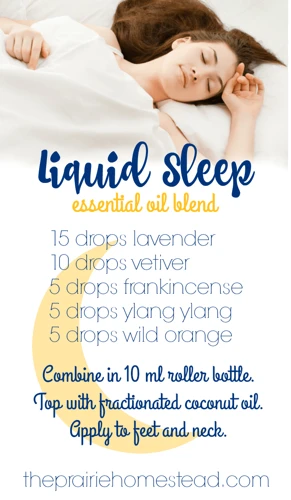
When it comes to using essential oils for better sleep and relaxation, there are a handful of options that have been found to be especially effective. These oils have unique properties that can help calm the mind and body, reduce stress and anxiety, and promote a sense of tranquility in the bedroom. Whether you’re looking to try out aromatherapy for the first time or want to explore new scents, here are some of the best essential oils for promoting restful sleep and a peaceful bedtime routine.
Lavender
Lavender is one of the most widely used essential oils for relaxation and sleep. This calming oil is known for its ability to reduce stress and anxiety, making it a great choice for those struggling with sleep issues. The aroma of lavender has a soothing and sedative effect, which can help to slow down the heart rate and lower blood pressure. As a result, it can induce feelings of relaxation and lead to a more restful night’s sleep.
There are many ways to use lavender essential oil for sleep. One of the most popular is to diffuse the oil in a diffuser or vaporizer. Simply add a few drops of lavender oil to the water in your diffuser and let it run in the bedroom while you sleep. Alternatively, you can add a few drops of lavender oil to a warm bath before bed or mix it with a carrier oil like coconut oil and use it for a relaxing massage.
When using lavender oil, it’s important to choose a high-quality product and to dilute it properly before use. Lavender essential oil can be irritating to the skin if used directly, so it’s best to mix it with a carrier oil before applying it to the skin. A typical dilution ratio is 1-2 drops of lavender oil per teaspoon of carrier oil.
Lavender essential oil is a great choice for those looking to improve their sleep quality and duration. Its calming and soothing effects can help to reduce stress and anxiety and promote relaxation, leading to a more restful night’s sleep. Incorporating lavender oil into your bedtime routine may be just what you need to get the deep and restorative sleep you deserve.
| Benefits of lavender essential oil for sleep |
|---|
| Reduces stress and anxiety – Lavender essential oil is known for its calming and soothing effects on the mind and body, helping to reduce stress and anxiety that can interfere with sleep. |
| Promotes relaxation – The aroma of lavender has a sedative effect, which can promote relaxation and lead to a more restful night’s sleep. |
| Improves sleep quality and duration – Incorporating lavender oil into your bedtime routine may help to improve the quality and duration of your sleep, leading to better overall health and well-being. |
Chamomile
Chamomile is a well-known herb that has been used for centuries to aid in relaxation and sleep. It is commonly found in tea form, but the essential oil can also be used for aromatherapy purposes. Here are some benefits of using chamomile essential oil for better sleep:
- Calming effects: Chamomile contains compounds that are known to have a calming effect on the body and mind. This can help to reduce anxiety and promote relaxation, making it easier to fall asleep.
- Anti-inflammatory properties: Chamomile also has anti-inflammatory properties that can help to soothe sore muscles and joints, which can lead to more restful sleep.
- Relieves insomnia: Chamomile essential oil has sedative properties that can help to relieve insomnia and improve the overall quality of sleep. It can also help to reduce nightmares and other sleep disturbances.
- Reduces stress: By inducing relaxation and reducing anxiety, chamomile essential oil can also help to reduce stress levels, which can contribute to better sleep.
- Gentle and safe: Chamomile essential oil is generally considered safe and gentle, making it a good choice for those who are new to aromatherapy.
To use chamomile essential oil for better sleep, it can be diffused in a bedroom before bedtime or added to a warm bath. It can also be diluted with a carrier oil, such as coconut or jojoba oil, and massaged into the skin before bed. As with all essential oils, it is important to dilute it properly and to choose a high-quality oil from a reputable source. If you have any health concerns or are pregnant or breastfeeding, it is important to consult a health professional before using chamomile essential oil.
Bergamot
Bergamot essential oil is another popular oil used in aromatherapy for its calming and relaxing properties. It is derived from the rind of the bergamot orange, which is native to Italy. Bergamot has a fresh, citrusy scent that is both uplifting and soothing. This oil is particularly useful for those who struggle with anxiety or depression as it has been shown to have mood-boosting effects.
Benefits:
– Reduces stress and anxiety
– Promotes relaxation
– Alleviates symptoms of depression
– Helps improve sleep quality
How to use:
– Diffuse bergamot essential oil in a diffuser or vaporizer before bedtime to promote relaxation and better sleep.
– Mix a few drops of bergamot with a carrier oil and use as a massage oil to ease tense muscles and promote relaxation.
– Add a few drops of bergamot to a warm bath for a calming and soothing experience.
– Bergamot can also be added to a pillow spray or moisturizer for a relaxing and refreshing scent.
Precautions:
– Bergamot is a phototoxic oil, which means that it can cause skin irritation or sunburn if applied directly to the skin and then exposed to sunlight. To avoid this, it is recommended to dilute bergamot in a carrier oil before use and avoid exposure to sunlight for at least 12 hours after use.
– Bergamot should be avoided by pregnant or breastfeeding women as well as individuals taking certain medications, such as antidepressants or blood pressure medications, without consulting a healthcare professional.
Ylang-Ylang
Ylang-Ylang essential oil is derived from the flowers of the Cananga tree, native to Asia. It has a sweet, floral scent that is known for its calming and relaxing effects. Ylang-Ylang is often used in aromatherapy to promote better sleep and reduce anxiety.
| Benefits of Ylang-Ylang Essential Oil |
|---|
| Reduces Anxiety: Ylang-Ylang oil is known for its ability to reduce feelings of anxiety and promote relaxation. Its calming effects can help calm the mind and promote better sleep. |
| Regulates Heart Rate: Ylang-Ylang oil can help regulate the heart rate by lowering blood pressure and reducing feelings of stress. This can promote a more restful sleep and reduce the risk of heart disease. |
| Improves Mood: The floral scent of Ylang-Ylang has been shown to help improve mood and reduce feelings of depression. This can help promote feelings of happiness and relaxation, which are essential for a good night’s sleep. |
| Enhances Intimacy: Ylang-Ylang oil has been used for centuries as an aphrodisiac. Its sweet, floral scent is said to enhance feelings of intimacy and promote a healthy sex life. |
When using Ylang-Ylang oil for aromatherapy, it is important to dilute it properly and follow safety precautions. It is also important to choose high-quality essential oils to ensure maximum benefits. Some popular methods of using Ylang-Ylang for better sleep include using it in a diffuser or adding a few drops to a warm bath or massage oil.
Ylang-Ylang essential oil can be a beneficial addition to any aromatherapy routine for those looking to promote better sleep and reduce feelings of stress and anxiety.
Sandalwood
Sandalwood is a sweet, woodsy scent that is often used in aromatherapy for its calming and grounding properties. It is derived from the wood of sandalwood trees and has been used in traditional medicine for centuries.
Here are some benefits of using sandalwood essential oil for sleep and relaxation, and some ways to incorporate it into your aromatherapy routine:
- Reduces Anxiety: Sandalwood essential oil has a calming effect on the mind and body, making it an effective way to reduce anxiety and stress. Its sedative effects can also help promote relaxation and reduce symptoms of insomnia.
- Improves Skin Health: In addition to its stress-reducing properties, sandalwood essential oil is also great for promoting healthy and smooth skin. It has anti-inflammatory and antimicrobial properties which can help soothe irritated skin and reduce the appearance of acne.
- Enhances Meditation: The grounding effects of sandalwood essential oil make it an excellent choice when practicing meditation or other mindfulness exercises. Its woody aroma can help focus the mind and promote a sense of inner peace and calmness.
To use sandalwood essential oil for better sleep and relaxation, you can try adding a few drops to a diffuser or vaporizer before bedtime. Alternatively, you can mix it with a carrier oil like coconut or jojoba and use it for a relaxing massage or bath.
Keep in mind that it is important to choose high-quality sandalwood essential oil and to properly dilute it before use. As with any essential oil, it is also recommended to consult with a healthcare professional before use, especially if you are pregnant, nursing, or have any medical conditions.
Aromatherapy Techniques for Better Sleep
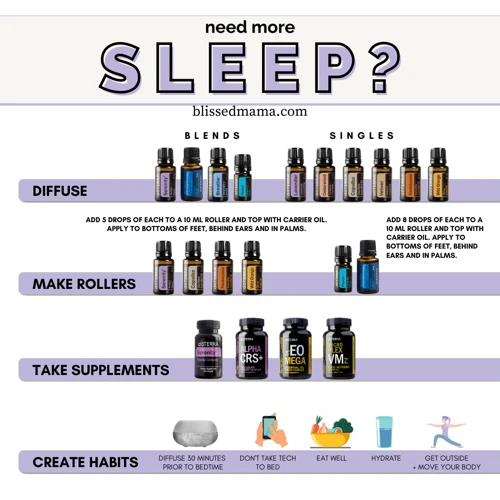
When it comes to promoting better sleep with aromatherapy, there are a variety of techniques that can be used. From diffusers to pillow sprays and massage oils, there are many ways to incorporate the benefits of essential oils into your nighttime routine. However, with so many options available, it can be overwhelming to know where to start. Let’s explore some of the most effective aromatherapy techniques for better sleep, along with tips for using them safely and effectively.
Diffusers and Vaporizers
One popular method for using aromatherapy for better sleep is through the use of diffusers and vaporizers. These devices work by dispersing essential oils into the air, allowing you to inhale the scents and experience their therapeutic benefits. Some benefits of using diffusers and vaporizers for aromatherapy include:
- Improved sleep quality: Diffusers and vaporizers can help create a relaxing and calming environment, which can promote better sleep.
- Reduced stress: Many essential oils used in diffusers and vaporizers have stress-relieving properties, which can help ease tension and promote relaxation.
- Cleansing the air: Some essential oils used in diffusers and vaporizers have antibacterial and antiviral properties, which can help cleanse the air and reduce your risk of illness.
- Eliminating bad odors: Diffusers and vaporizers can help mask unpleasant smells, creating a more pleasant environment for sleep.
When using diffusers and vaporizers for aromatherapy, it’s important to choose high-quality essential oils and follow the manufacturer’s instructions for use. Additionally, make sure to clean your device regularly to avoid the buildup of bacteria or mold. Some popular essential oils for diffusers and vaporizers include lavender, chamomile, bergamot, ylang-ylang, and sandalwood.
Pillow Sprays and Moisturizers
Using pillow sprays and moisturizers is another effective way to incorporate aromatherapy into your sleep routine. These products typically contain a blend of essential oils specifically designed to promote relaxation and better sleep. They can be sprayed directly onto pillows and linens or applied as a moisturizer before bedtime.
Benefits of Pillow Sprays and Moisturizers
Pillow sprays and moisturizers provide several benefits for those looking to improve their sleep quality. Firstly, the pleasant scent of essential oils can help relax the mind and body, reducing stress and promoting a calm state conducive to sleep. Additionally, the act of spraying or applying the product can also be a calming ritual, providing a sense of comfort and routine before bedtime.
Choosing the Right Pillow Sprays and Moisturizers
When choosing a pillow spray or moisturizer, it is important to look for products made with high-quality essential oils and natural ingredients. Avoid products with synthetic fragrances, as these can cause adverse health effects and may not provide the same therapeutic benefits as natural oils. Additionally, be sure to choose a scent that resonates with you and promotes relaxation.
How to Use Pillow Sprays and Moisturizers
To use a pillow spray, simply shake the bottle and spritz a few sprays on your pillow and bedding before getting into bed. Alternatively, you can spray the product into the air and let it settle on your linens. For a moisturizer, apply a small amount to your hands and massage into your skin before bedtime, focusing on areas like your neck and temples.
| Benefits | Choosing | How to use |
|---|---|---|
| Promotes relaxation and better sleep | Look for high-quality essential oils and natural ingredients | Shake bottle and spritz on pillow and linens for pillow sprays; apply a small amount to skin for moisturizers |
| Can provide a calming ritual before bedtime | Avoid synthetic fragrances | Massage moisturizer into skin, focusing on areas like neck and temples |
Incorporating pillow sprays and moisturizers into your bedtime routine can be a simple yet effective way to reap the benefits of aromatherapy for better sleep. Just be sure to choose high-quality, natural products and select a scent that promotes relaxation and tranquility.
Baths and Massage Oils
Using aromatherapy through baths and massage oils can lead to deeper relaxation and better sleep. Adding a few drops of essential oils to a warm bath can help to soothe the body and mind, relieve muscle tension, and promote relaxation. Some of the best essential oils to use in a bath include lavender, chamomile, and ylang-ylang. To use essential oils in a bath, mix no more than 10 drops with a tablespoon of a carrier oil such as jojoba or almond oil before adding it to the water.
Massage oils can be another effective way to use aromatherapy for better sleep. Massaging the body helps to release tension and promote relaxation, and adding essential oils to the massage oil can enhance these effects. Oils such as lavender, sandalwood, and bergamot are great choices for massage as they help to calm the mind and relax the body. To make a massage oil, simply mix 5-6 drops of essential oil with a tablespoon of carrier oil such as coconut or sweet almond oil.
When using essential oils in the bath or for massage, it’s important to choose high-quality oils that are free from synthetic additives and to dilute them properly to avoid skin irritation or other adverse effects. Additionally, it’s important to consult with a health professional before using any new essential oil, especially if you have sensitive skin or a medical condition. By using aromatherapy through baths and massage oils, you can tap into the relaxing properties of essential oils and enjoy a deeper, more restful sleep.
Aromatherapy Safety and Precautions

When it comes to using essential oils for aromatherapy, it’s important to take certain precautions to ensure your safety and avoid negative side effects. While many essential oils have therapeutic benefits, some can be harmful if used incorrectly. It’s essential to be aware of the proper methods for using essential oils and to take necessary precautions to avoid any potential harm. In this section, we will discuss some important safety tips to keep in mind when using essential oils for better sleep.
Diluting Essential Oils Properly
Essential oils are highly concentrated plant extracts that can cause skin irritation, allergic reactions, or even toxicity if not diluted properly before use. Diluting essential oils properly is crucial to prevent adverse effects and maximize their benefits for better sleep. Here are some tips for diluting essential oils safely:
- Use a Carrier Oil: Carrier oils, such as jojoba, almond, or coconut oil, are used to dilute essential oils to a safe concentration. A general rule is to use a ratio of 2-3 drops of essential oil per 1 teaspoon of carrier oil. However, the dilution ratio may vary depending on the essential oil and the intended use.
- Perform Patch Test: Before using any essential oil, it’s recommended to perform a patch test to check for any skin sensitivity or allergic reactions. Apply a small amount of diluted oil to the inside of your elbow and wait for 24 hours. If no adverse reaction occurs, the oil is considered safe to use.
- Follow Recommended Dilution Guidelines: Essential oils have different potency levels, and some are more potent than others. It’s essential to follow the recommended dilution guidelines for each essential oil to prevent skin irritation or adverse reactions. For instance, lavender and chamomile oils are considered safe to use undiluted in small amounts, while cinnamon and peppermint oils should always be diluted.
- Avoid Overexposure: Even diluted essential oils can cause overexposure if used excessively or for long periods. It’s recommended to limit the use of essential oils to a few drops per application and avoid using them continuously for more than two weeks. If you experience any adverse reactions or discomfort, stop using the oil immediately.
By following these tips for diluting essential oils properly, you can enjoy the benefits of aromatherapy for better sleep without risking your health. However, it’s essential to remember that each person may react differently to essential oils, and some oils may not be suitable for pregnant women, children, or people with certain medical conditions. Consulting a health professional or a certified aromatherapist can provide more personalized advice on the use of essential oils for better sleep.
Choosing High-Quality Essential Oils
When it comes to choosing essential oils for aromatherapy, it’s important to prioritize quality over quantity. Not all essential oils are created equal, and some may be adulterated or of poor quality. To ensure that you get the best results from aromatherapy, be sure to follow these tips when choosing essential oils:
- Look for pure essential oils: Make sure that the essential oils you purchase are made solely from the plant material stated on the label. Avoid any products that contain synthetic fragrances or other additives.
- Check the Latin name: Essential oils can have different effects depending on their plant species and origin. Check the Latin name on the label to ensure that you are getting the exact oil you need for your desired effect.
- Choose reputable brands: Look for established and well-known essential oil brands that adhere to strict quality control guidelines. This can help ensure that the oils you purchase are of a high standard and free from contaminants.
- Check for third-party testing: Some essential oil brands may have their products tested by independent third-party laboratories. This can provide additional assurance of the oils’ purity and quality.
- Avoid cheap essential oils: While it may be tempting to opt for cheaper essential oils, they are often of lower quality and may not have the desired effects. Investing in higher-quality oils can be more effective and cost-efficient in the long run.
By following these tips, you can ensure that you are choosing high-quality essential oils for your aromatherapy practices, leading to better and more effective results.
Consulting a Health Professional
When it comes to using aromatherapy for better sleep, it’s important to consult a health professional before beginning any new treatment. This is especially important if you have any medical conditions or are taking any medications that could interact with the essential oils.
Why Consult a Health Professional?
Consulting a health professional such as a doctor, nurse, or licensed aromatherapist can help you ensure that you’re using essential oils safely and effectively. They can also help you identify any potential risks or side effects that you may not be aware of and provide guidance on dosages and frequency of use.
Additionally, some essential oils can be toxic if ingested, and others can cause skin irritation or allergic reactions. A health professional can help you identify any allergies or sensitivities you may have and recommend alternative oils or delivery methods.
What to Expect During a Consultation
During a consultation with a health professional, they will likely ask about your medical history, current medications, and any symptoms you’re experiencing. They may also ask about your sleep habits and any issues you’re having with falling or staying asleep.
Based on this information, they can recommend specific essential oils or blends that may be helpful for your individual needs. They can also advise you on the best delivery methods and provide guidance on how often to use the oils.
Conclusion:
Consulting a health professional is an important step to take before using aromatherapy for better sleep. They can help you ensure that you’re using essential oils safely and effectively, as well as identify any potential risks or side effects. By working with a qualified professional, you can enjoy the benefits of aromatherapy while staying safe and healthy.
| Benefits of Consulting a Health Professional |
|---|
| – Ensures safe and effective use of essential oils |
| – Identifies potential risks or side effects |
| – Recommends specific oils and blends based on individual needs |
| – Provides guidance on dosages and frequency of use |
| – Advises on best delivery methods |
Additional Tips for Better Sleep
Quality sleep is essential for overall health and wellbeing. While aromatherapy can certainly help to improve the quality of sleep, there are also some additional tips you can follow to optimize your sleep environment and habits.
Create a Relaxing Atmosphere: Transform your bedroom into a sanctuary by minimizing clutter, using calming colors, and adding soothing elements such as plants or a comfortable mattress and pillows. This can create a relaxing atmosphere that can help you feel at ease and reduce stress.
Maintain a Consistent Sleep Schedule: Go to bed and wake up at the same time every day, even on weekends. This helps regulate the body’s internal clock and can improve the quality of sleep.
Avoid Stimulants: Caffeine, nicotine, and alcohol can disrupt sleep patterns, so it’s best to avoid using these substances at least a few hours before bedtime.
Limit Screen Time: The blue light emitted from electronic devices such as smartphones, tablets, and computers can suppress the production of the sleep hormone melatonin. Turn off electronics at least one hour before sleep to help your brain prepare for rest.
Get Regular Exercise: Regular exercise has been shown to improve sleep quality, but it’s best to exercise earlier in the day rather than right before bed.
Practice Relaxation Techniques: Meditation, deep breathing, yoga, and other relaxation techniques can help to reduce stress and tension, allowing you to fall asleep more easily.
Incorporating these additional tips into your sleep routine can enhance the effects of aromatherapy and help promote a more restful night’s sleep. Remember that everyone’s sleep needs are different, so it may take some trial and error to find the best routine that works for you.
Conclusion
In conclusion, aromatherapy can be a wonderful natural tool to help improve our sleep quality and overall well-being. By using specific essential oils that have been scientifically shown to have relaxing and calming properties, we can create a soothing environment in our bedrooms that promotes restful sleep.
It’s important to keep in mind that aromatherapy is not a magic solution to all sleep problems. It’s a complementary therapy that can work alongside other healthy sleep habits and practices, such as maintaining a consistent bedtime routine, avoiding caffeine and electronics before bed, and ensuring a comfortable sleep environment.
When using essential oils for aromatherapy, it’s crucial to keep safety in mind. Diluting essential oils properly and selecting high-quality oils from reputable sources is key to avoiding potential adverse reactions. It’s also important to consult with a health professional if you have any underlying health conditions or concerns.
Overall, incorporating aromatherapy into your sleep routine can be a relaxing and enjoyable way to promote better sleep and reduce stress and anxiety. Consider trying different essential oils and aromatherapy techniques to find what works best for you and enjoy the benefits of a restful night’s sleep.
Frequently Asked Questions
Can aromatherapy really improve my sleep?
Yes, aromatherapy has been shown to have a positive impact on sleep quality and duration by reducing stress and anxiety.
How does aromatherapy work?
Aromatherapy works by stimulating the olfactory system (sense of smell), which sends signals to the limbic system (emotional center of the brain) to elicit a relaxation response.
Which essential oils are best for promoting sleep?
The best essential oils for sleep are lavender, chamomile, bergamot, ylang-ylang, and sandalwood.
How do I use essential oils for better sleep?
You can use essential oils for better sleep through diffusers and vaporizers, pillow sprays and moisturizers, or baths and massage oils.
Are there any precautions I should take when using essential oils?
Yes, it is important to properly dilute essential oils and choose high-quality oils. Consult with a health professional before use, especially if you have any underlying medical conditions.
Can I use aromatherapy if I have sensitive skin or allergies?
If you have sensitive skin or allergies, it’s best to do a patch test before using essential oils. It’s also important to choose oils that are safe for your skin type.
What is the difference between essential oils and fragrance oils?
Essential oils are derived from natural sources like plants, while fragrance oils are synthetic and may contain harmful chemicals. Essential oils are considered safer and more effective for aromatherapy.
How long do I need to use aromatherapy before I see results?
Results may vary, but many people see benefits from using aromatherapy for sleep within a few days to a few weeks.
Can I use aromatherapy as a substitute for prescription sleep aids?
Aromatherapy can be used as a complementary therapy, but it should not be used as a substitute for prescription sleep aids without consulting a health professional.
What other tips can I try to improve my sleep?
You can try practicing good sleep hygiene, such as setting a consistent sleep schedule, creating a comfortable sleep environment, limiting screen time before bed, and avoiding caffeine and alcohol before bedtime.

